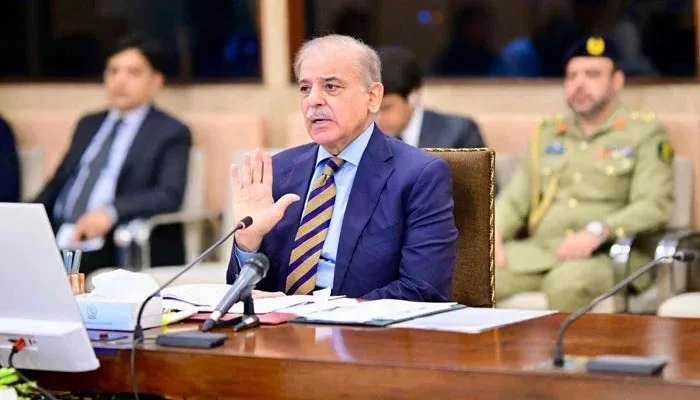ISLAMABAD – Prime Minister Shehbaz Sharif is set to chair an emergency National Security Committee (NSC) meeting today to assess the escalating situation following India’s recent retaliatory actions in the wake of the Pahalgam attack in Indian Illegally Occupied Jammu and Kashmir (IIOJK). The meeting, scheduled for 11 a.m., will bring together top civilian and military leadership to deliberate on both internal and external security matters.
Foreign Minister’s Statement
Deputy Prime Minister and Foreign Minister Ishaq Dar confirmed in a statement on Geo News’ programme Aaj Shahzeb Khanzada Kay Sath that the NSC will issue a “comprehensive reply” to India’s actions. Dar condemned India’s measures as “inappropriate and lacking seriousness” and pointed out that New Delhi has not provided any concrete evidence linking Pakistan to the terrorist attack, which resulted in the deaths of 26 tourists in Pahalgam.
“Shifting blame onto Pakistan for its internal issues is unjustified,” Dar remarked, emphasizing that India’s reaction was an overreaction to a tragic incident.
India’s Actions Against Pakistan
Following the Pahalgam attack, the Indian government, led by Prime Minister Narendra Modi, swiftly announced several punitive measures, including the suspension of the Indus Water Treaty and a travel ban on Pakistani nationals. The Ministry of External Affairs (MEA) outlined five steps, which it described as a “decisive response to cross-border terrorism.”
Read: Pahalgam Attack: Tragedy or Timed Tactic? A Pattern India Can’t Ignore
Among the measures is the suspension of the Indus Water Treaty, a water-sharing agreement between Pakistan and India, brokered by the World Bank. The treaty divides control over the rivers of the Indus basin, with Pakistan managing the three western rivers (Indus, Jhelum, and Chenab) and India controlling the eastern rivers (Ravi, Beas, and Sutlej).
Additionally, India has closed the Integrated Check Post Attari and issued a deadline for Pakistani nationals to leave India by May 1, 2025. Pakistani nationals will also be banned from entering India under the SAARC Visa Exemption Scheme (SVES), with any existing SVES visas being annulled. Pakistanis currently in India under these visas have been given 48 hours to exit the country.
Another significant step is the expulsion of military, naval, and air advisors from the Pakistani High Commission in New Delhi, who have been declared persona non grata and must leave within a week. In return, India plans to reduce its diplomatic presence in Islamabad, cutting its High Commission staff from 55 to 30 by May 1.
Pakistan’s Strong Response
Defence Minister Khawaja Asif echoed Dar’s sentiments, stating that India cannot unilaterally suspend the Indus Water Treaty, as it involves the World Bank and other international stakeholders. He noted that India had long sought to withdraw from the treaty but assured that Pakistan is fully prepared to respond robustly if necessary.
Asif reiterated Pakistan’s position, saying the country has no involvement in the Pahalgam incident. “Pakistan condemns terrorism in all its forms, anywhere in the world,” he declared. Asif also warned India that any extreme steps could provoke a decisive military response, drawing parallels to the Abhinandan episode in 2019 when Pakistan shot down an Indian MiG-21 and captured Indian pilot Abhinandan Varthaman.
Diplomatic Tensions Rise
Tensions between the two nuclear-armed neighbors have reached new heights as India’s actions continue to fuel the debate over its handling of the Kashmir issue. Pakistan’s leadership has expressed grave concern over the implications of India’s unilateral actions, which may further destabilize the already volatile region.
As the NSC meeting unfolds today, the world watches as Pakistan evaluates its options for a fitting response to India’s provocative measures, underscoring the urgent need for diplomatic solutions amidst growing regional insecurity.
Follow us on Google News, Instagram, YouTube, Facebook, Whats App, and TikTok for latest updates
